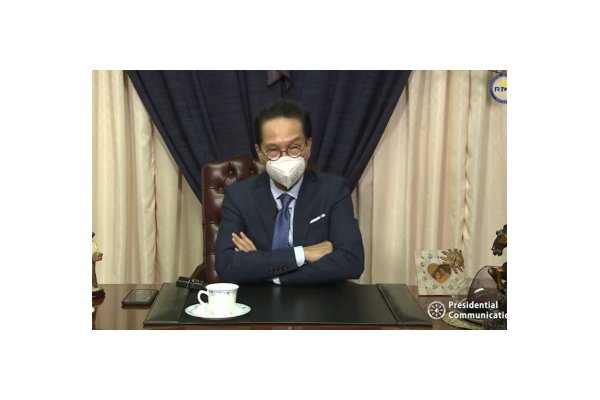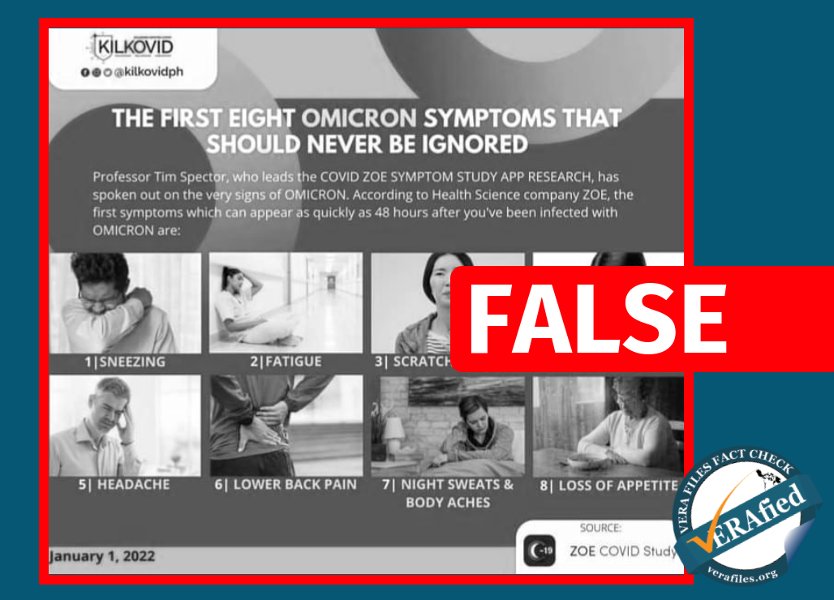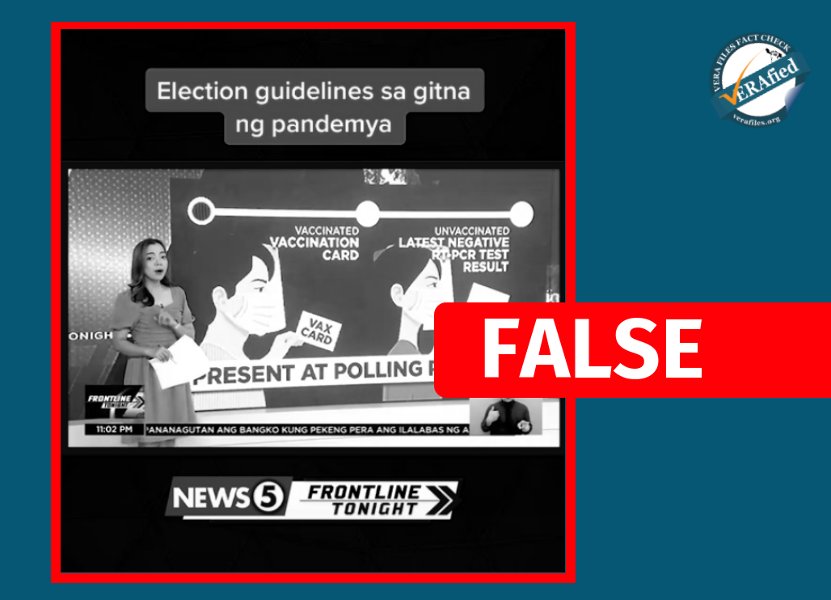Chief Presidential Legal Counsel Salvador Panelo claimed that a vaccine is “not needed” to control the spread of the coronavirus disease 2019 (COVID-19), and that New Zealand and Vietnam did not impose lockdowns to curb the pandemic.
Both claims are false.
STATEMENT
In the March 16 episode of his hour-long talk show Counterpoint aired on government broadcast channels, Panelo asserted that Filipinos just need to practice minimum public health standards to contain the spread of COVID-19.
He said:
“[P]aulit-ulit ko pong sasabihin sa inyo, we don’t need a lockdown. We don’t need even (sic) a vaccine, kung sa totoo lang, kung tayo lang ay susundin lang natin ‘yung minimum health protocols … Tignan niyo, New Zealand, Vietnam, and Taipei, anong ginawa nila? Nag-lockdown ba sila? Hindi.”
(I will keep on saying this: We don’t need a lockdown. We don’t even need a vaccine, to be honest, if only we follow the minimum health protocols. Look at New Zealand, Vietnam, and Taipei. What did they do? Did they impose a lockdown? No.)
Source: RTVMalacanang, Counterpoint by Secretary Salvador Panelo 3/16/2021, March 17, 2021, watch from 5:04 to 5:28
The secretary said these jurisdictions were able to contain the virus “simply” by strictly imposing the wearing of masks and face shields, washing of hands, and observing physical distancing.
FACT
Panelo is wrong on two grounds.
First, local and international health authorities alike have stressed the importance of vaccines in the context of the COVID-19 pandemic.
The World Health Organization had said safe and effective vaccines will be a “gamechanger” in the battle against the disease, which has so far globally infected 125,160,225 people, of whom 2,748,737 have died as of 11:44 p.m. on March 26.
The Department of Health (DOH) said vaccination is “an important way to protect [oneself] from getting severe COVID-19,” along with following minimum public health standards.
Vaccination is also crucial to achieve “herd immunity,” which WHO defines as the “indirect protection [of a population] from an infectious disease.” This may be achieved only when a “substantial portion” of the population (at least 70%, according to DOH) is vaccinated. (See VERA FILES FACT SHEET: What to expect once the COVID-19 vaccines are rolled out)
Once herd immunity is reached, “cases steeply decline” because the “odds of coming in contact with an infected person are so low,” according to a global team of public health experts convened by the international nonprofit Meedan.
Vaccines are biological products that contain a “killed” or “weakened” version, or parts, of a bacteria or virus that causes a particular disease, such as COVID-19, used to train the body’s immune system to develop long-lasting immunity. (See VERA FILES FACT SHEET: Five questions on COVID-19 vaccines, answered)
Developing immunity through vaccination means “there is reduced risk of developing the illness and its consequences,” WHO said in an April 2020 article. It added:
“Getting vaccinated may also protect people around you, because if you are protected from getting infected from a disease, you are less likely to infect someone else.”
Panelo’s claim also contradicts the stance of President Rodrigo Duterte, who said in a televised address in April last year that these jabs are the “solution” to the pandemic, “nothing else.” (See VERA FILES FACT CHECK: Duterte says he’s been warning of ‘deadly’ COVID-19 from the beginning. Not quite.)
Second, while Taiwan (where Taipei City is located) has, indeed, not employed a widespread lockdown to curb the spread of the virus, both New Zealand and Vietnam had on numerous occasions.
In 2021 alone, the New Zealand government placed Auckland, the country’s biggest and most populous city, under “Alert Level 3,” its second most stringent set of restrictions, twice: on Feb. 14 (for three days) and on Feb. 27 (for seven days).
Under Alert Level 3, people “legally must stay at home” when not at work or school, but are advised to do both from home when possible. Travel and public gatherings are also limited, while public venues, including gyms and cinemas, among other establishments, are closed.
New Zealand first implemented such restrictions on March 23 last year for two days, after which it moved to “Alert Level 4” (the highest level), as the nation went into “self-isolation,” until April 27, 2020. Prime Minister Jacinda Ardern, at the time, said, “these decisions will place the most significant restrictions on New Zealand’s movements in modern history.”
In Southeast Asia, Vietnam was the first country to impose lockdown measures, when it placed under quarantine the entire Son Loi commune in Vinh Phuc province, near capital Hanoi, for 20 days beginning Feb. 13, 2020. This was after a cluster of COVID-19 cases were detected in the area. (See VERA FILES FACT CHECK YEARENDER: The Duterte administration’s share of COVID misinformation)
In April last year, the government implemented a 15-day nationwide “social distancing” order, which meant “every household, village, commune, district, and province” must go into “self-isolation,” according to the Vietnam Government Portal.
The Philippines is the hardest-hit country in the Western Pacific Region of WHO — which also includes New Zealand, Vietnam, and Taiwan — as of March 25.
In the same Counterpoint episode, Panelo misleadingly claimed that gargling with salt and water would help prevent COVID-19 infection. (See VERA FILES FACT CHECK: Panelo misleads in suggesting gargling with salt water can prevent COVID infection)
Sources
RTVMalacanang, Counterpoint by Secretary Salvador Panelo 3/16/2021, March 17, 2021
On vaccines
- Department of Health, Updates on COVID-19 Vaccines, Accessed March 26, 2021
- World Health Organization, COVID-19 vaccines, Accessed March 26, 2021
- U.S. Centers for Disease Control and Prevention, Benefits of Getting a COVID-19 Vaccines, Accessed March 26, 2021
- World Health Organization, WHO Coronavirus (COVID-19) Dashboard, Accessed March 26, 2021
- Department of Health, FAQs: Vaccines, Accessed March 26, 2021
- Department of Health, GUIDELINES ON THE RISK-BASED PUBLIC HEALTH STANDARDS FOR COVID-19 MITIGATION, April 27, 2020
- World Health Organization, Coronavirus disease (COVID-19): Herd immunity, lockdowns and COVID-19, Dec. 31, 2020
- Meedan COVID-19 Vaccine Media Hub, Vaccine Basics, March 8, 2021
- World Health Organization, COVID-19: What we know about the future of COVID-19 vaccines, April 24, 2020
- RTVMalacanang, Talk to the Nation on COVID-19 4/6/2020, April 7, 2020
On New Zealand lockdown
- Covid19.govt.nz, About the Alert System, Accessed March 22, 2021
- New Zealand Herald, Auckland shifted to Alert Level 3, rest of NZ to level 2 | nzherald.co.nz, Feb. 14, 2021
- New Zealand Ministry of Health, COVID-19 (novel coronavirus) update – 27 February, 2021 9pm | Ministry of Health NZ, Feb. 27, 2021
- Covid19.govt.nz, Alert Level 3, Accessed March 22, 2021
- Covid19.govt.nz, History of the COVID-19 Alert System, Accessed march 22, 2021
- Reuters, New Zealand prepares to enter lockdown as coronavirus cases surge, March 23, 2020
On Vietnam lockdown
- VNExpress International, How Vietnam fought a pandemic and won, Dec. 22, 2020
- The Straits Times, Vietnam quarantines area with 10,000 residents over coronavirus fears, Feb. 13, 2020
- Reuters, Vietnam quarantines rural community of 10,000 because of coronavirus, Feb. 13, 2020
- Nikkei Asia, Vietnam locks down Son Loi district near Hanoi for 20 days, Feb. 14, 2020
- VIetnam Law and Legal Forum, PM orders strict nationwide social distancing rules, starting April 1, March 31, 2020
- The Online Newspaper of the Government of the Socialist Republic of Vietnam, Viet Nam to go into 15-day nationwide social distancing to curb COVID-19, March 31, 2020
(Guided by the code of principles of the International Fact-Checking Network at Poynter, VERA Files tracks the false claims, flip-flops, misleading statements of public officials and figures, and debunks them with factual evidence. Find out more about this initiative and our methodology.)




